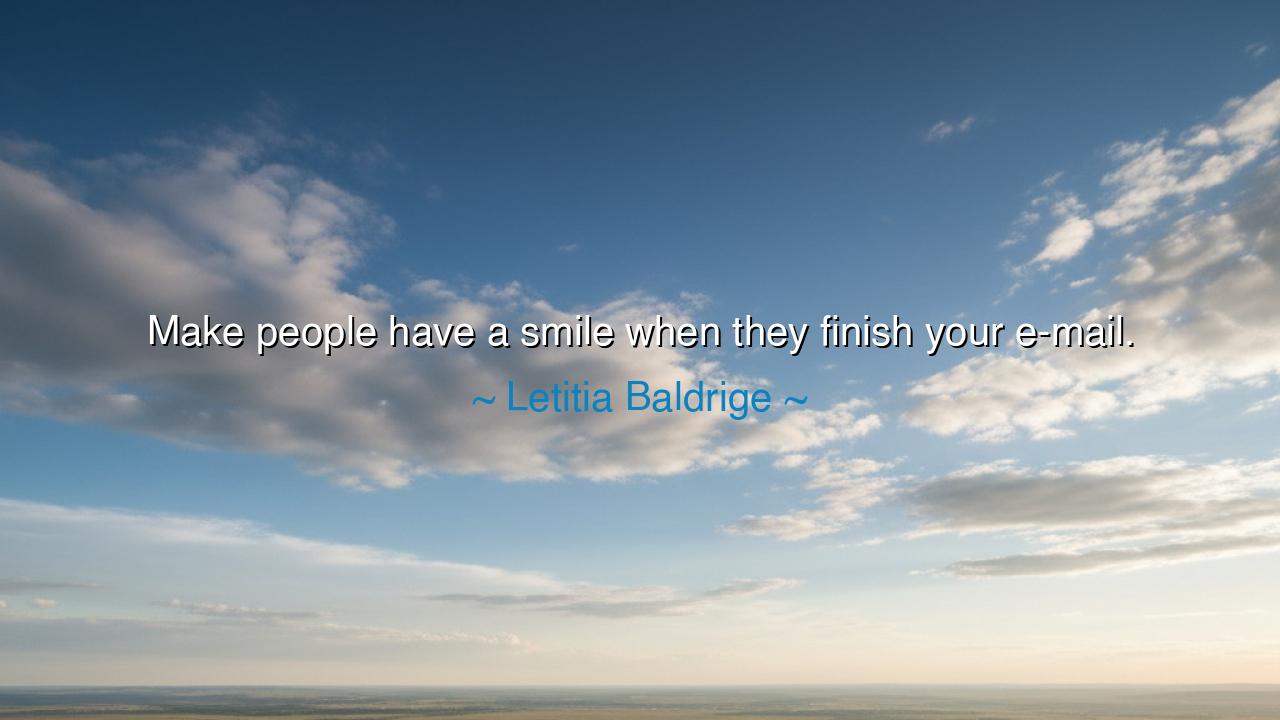
Make people have a smile when they finish your e-mail.






Letitia Baldrige, lady of elegance and counsel to statesmen, once gave this timeless instruction: “Make people have a smile when they finish your e-mail.” Though the words are clothed in the garments of the modern world, their spirit is as ancient as the art of human connection. For she reminds us that even in the briefest exchanges, in letters and messages that may seem fleeting, we hold the power to leave behind warmth, to stir joy, and to turn duty into delight.
The ancients knew the power of the written word. Cicero’s letters, sent to friends and family, were not only full of news and arguments, but also of humor, affection, and encouragement. Long before the dawn of the e-mail, men and women understood that correspondence was more than the exchange of information—it was the weaving of relationships, the cultivation of trust, the sharing of spirit across distance. Baldrige’s wisdom is a continuation of this truth: that our written words should not merely instruct, but inspire; not merely direct, but uplift.
Consider the story of Abraham Lincoln, who, in the midst of war, still found time to write letters of consolation to grieving mothers or encouragement to weary soldiers. His words were often marked by kindness, even when the matters at hand were grave. To those who received them, the burden was made lighter, if only by a phrase or a gentle touch of humor. This is the very principle Baldrige speaks of: when others finish reading what you have written, let their hearts be softened, let their faces carry a smile, for then your words have done more than communicate—they have healed.
Her quote also carries with it the spirit of courtesy, of which she was the great modern champion. In an age where words are sent quickly, often without thought, she urges us to pause and consider the effect of our tone. A harsh e-mail may wound for days, while a kind one may sustain for weeks. To infuse even the smallest notes with grace is to recognize that every exchange is a chance to shape the world, one heart at a time.
Mark this well: the smile is not a trivial thing. It is the sign of connection, the mark of goodwill, the fruit of kindness sown in words. To “make people have a smile” is to give them more than information—it is to give them a fragment of peace. In a world crowded with noise, such fragments are treasures, rare and remembered. The writer who leaves smiles in their wake builds not only networks but legacies, not only contacts but friendships.
Practical wisdom follows: before sending your words into the world, pause and read them as the receiver would. Do they uplift, or do they burden? Do they leave the spirit brighter, or darker? Add the phrase of encouragement, the note of gratitude, the touch of humor. Even in correction, let there be kindness; even in brevity, let there be humanity. For these small acts may shape the spirit of another’s entire day.
Therefore, O seeker, let Letitia Baldrige’s words be carved into your heart: when you write, write not only to be understood, but to be felt. Let your e-mails, your letters, your messages, be vessels of kindness. For though the paper may vanish, though the screen may go dark, the smile you bring to another endures. And in that smile, your words achieve immortality, carrying light across the ages like the letters of the ancients, remembered not for their ink, but for the warmth of the soul behind them.






AAdministratorAdministrator
Welcome, honored guests. Please leave a comment, we will respond soon